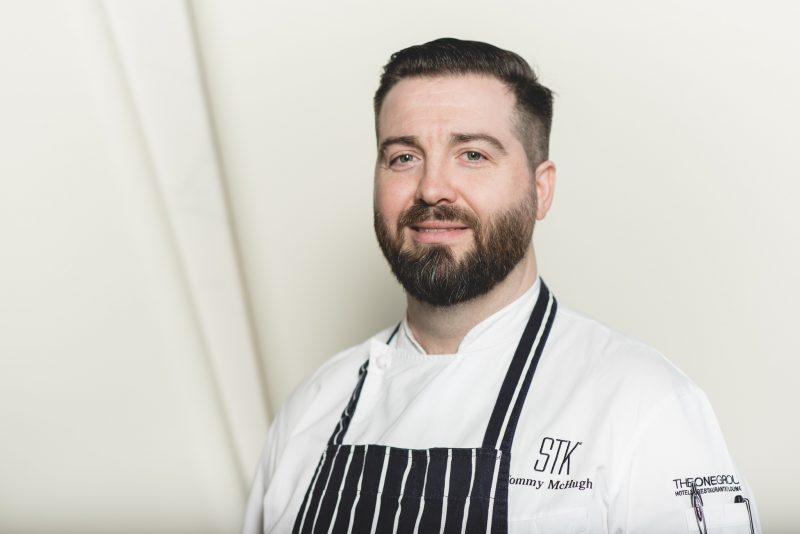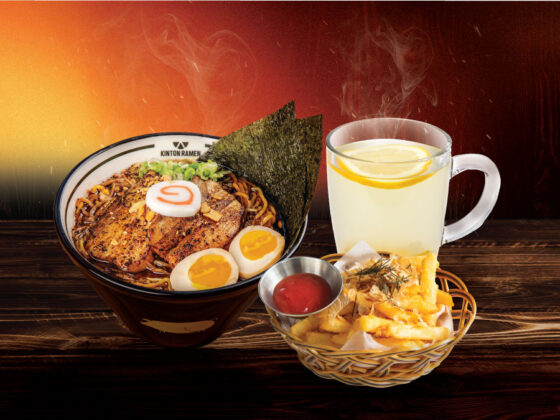Chef Tommy McHugh has been with STK Yorkville since it’s inception in 2016. Working at some of the world’s most revered restaurants with Michelin Star winning chefs set McHugh up for success. When we interviewed him in 2017 as one of our “Chefs of the Week”, the graduate of George Brown’s renowned Culinary School gave us insight into the challenges of the culinary world. Now, two years later, he is still leading the kitchen at STK and still supporting his team. This time, we wanted to find out more of what it is like to be the Executive Chef at a modern, world-class restaurant.
What does an executive chef do?
My job is to set everyone up for success, from the dish pit crew to the executive sous-chef and everyone in between. If the kitchen crew is setup for success, the cooks are properly learning how to create a dish from start to finish. If it isn’t done right, you’re adding unnecessary work onto other peoples already busy day.
How did you get your start at STK?
A friend of mine, whom I worked with in London, shared that she started working for STK in London. I reached out and asked how she enjoyed working for the company, and she only had very positive things to say. I gave her my CV to pass forward, and 3 months later I had a phone interview and was asked to fly down to New York for a cooking trial. Two days after I got back, I was offered the position of Executive Chef and have been with STK ever since.
ADVERTISEMENT |
Cooking what is in season and using locally sourced ingredients are becoming more and more important in the food industry. What ingredients does STK source locally?
We source as much as we can from Ontario. Tenderloins, lamb, short ribs, chicken and cheeses. Something I’m very proud of is that most of our food comes directly from Ontario’s backyard. We also have such an amazing variety of fruit and vegetables that change seasonally, something we take advantage of with our dishes on the core menu and our specials that we offer daily.
What local ingredients would we find in your refrigerator right now?
My wife recently took a cheese class at George Brown (my old college), so she’s on a massive Ontario cheese kick. It also doesn’t hurt that we’re friends with Afrim Pristine from the Cheese Boutique, so our fridge is full Ontario cheeses. I’m totally ok with that, lol.
Tell us a little bit about the dishes that you have brought to STK’s menu?
I wanted to bring dishes that show my training and understanding of working in high volume restaurants that serve excellent food. It’s a balancing game where you need to make something that people crave, but realistic of the covers you’re going to be doing, so you ensure it is consistently perfect every time. One of the dishes I’m proud to have added to the menu here is our Mediterranean sea bass dish. It’s served with a Kedgeree curry sauce that goes with our “Chavot rice”. The pickled veg and the crispy oyster mushrooms make it the perfect combination for someone who wants something non-steak. It also looks as good as it tastes.
When we interviewed you in 2017, we asked you what your current favourite dish on the menu was and your answer was the sticky toffee pudding. Is that still your favourite?
Ha! Sticky toffee pudding will always be my favourite, I can confidently say that in my opinion, it is the best dessert in the city hands down. But, having said that, I think our Spicy Cauliflower side dish it’s my take on Korean barbeque sauce meets Buffalo wing sauce. The perfect mixture of heat, sweet and sour with a wicked crunch from the cauliflower.
ADVERTISEMENT |
When you were at George Brown, a professor told your class that the capital of cooking was London and that if anyone held a British passport they should head to London and get “true brigade training” in a five-star hotel before it became obsolete. You followed that advice. What would you tell a culinary student? Is “brigade training” obsolete?
Everything in life “ebbs and flows”, what’s in now, will be out in a few years, and so on. The brigade system is timeless and universal, although right now I think for the vast majority of kitchens, it’s out of fashion, or they simply haven’t been exposed to it, so they don’t realize what they’re missing. My advice to a young cook is to find a kitchen that has structure and a clear list of goals and achievements. Cooks are hungry to learn and want clear goals to work towards. The brigade system provides that and is an environment where you can’t take any shortcuts. More and more people are starting to come back to the basics and the classic way of cooking, which makes me very optimistic for this industries future.
You have worked with so many high profile chefs including Michelin Star winning Joel Robuchon. Who is the one chef that you would love to work with but haven’t yet?
That’s a fantastic question! I’ve worked with so many inspiring chefs, but I’d have to say it would have been amazing to have worked for my very first Chef, Peter Kromberg, for a longer period of time or again when I was older and a stronger chef. I worked with Chef Kromberg for 3 months before he retired and I watched all these mega star chefs come into the kitchen one by one to thank him, and wish him the best. It was awe-inspiring for a 21-year old Toronto kid straight out of George Brown. I learned so many key basics from him, and his brigade, but to be able to have cooked with him now, at my level would be a dream come true. Sadly, Chef died about 10-years ago. So, whenever I feel like a Kromberg fix, I go onto YouTube and watch his videos. I mean, crème patisserie based souffles for 800! Are you kidding me! What a legend.
In partnership with STK.





